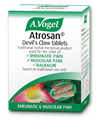Kick it up a notch!
Our Herbamare combines herbs and vegetables with a little sea salt to create a delicious, healthy seasoning for any dish!
Joint pain is one of the more common menopause symptoms and it can be one of the more debilitating as it reduces mobility and flexibility. Here, our menopause expert Eileen Durward talks about what triggers joint pain in the menopause, and how it can be eased through lifestyle changes and natural remedies.
Joint pain affects many people as they get older and is also common among menopausal women. Aches, stiffness and swelling around the joint and sometimes heat are typical symptoms of menopausal joint pain. These may be worse in the morning, improving as the day continues.
Joints which experience high impact such as the hips and knees tend to be most affected by this so called ’menopausal arthritis.’ Hands and fingers can also be affected. High impact exercise such as jogging can exacerbate the problem, although this is often eased with rest.
The hormone oestrogen has an important role in maintaining joint and bone health. It is not certain how it does this, but it is thought that it works by minimising swelling around the joint. As you reach the menopause, levels of oestrogen in your body begin to drop. This gives rise to common menopause symptoms including hot flushes and night sweats, and may also result in swollen and painful joints.
Dehydration can also cause joint pain because of a build up of uric acid which can cause inflammation in your joints. Oestrogen is also important for regulating fluid levels in your body, and with falling levels of the hormone, you find that your body is unable to retain water efficiently.
It is important to reduce the pressure of repetitive strain, such as jogging on hard roads, to protect your joints. At the same time though, keeping them flexible will reduce joint pain. Some exercises such as yoga and swimming are beneficial for strengthening your muscles and joints without exerting too much pressure on them.
Diet can have a positive influence on your joint health. Many fruit and vegetables have properties which reduce inflammation. Having a balanced diet is not only healthy and will help you with many menopause symptoms, but will keep your weight level correct. Being overweight will add extra stress onto your joints, increasing your problem.
Calcium is particularly important as it keeps your bones strong and healthy. As you are going through the menopause you may find a calcium supplement beneficial. However, for calcium to be absorbed into your bloodstream effectively, it is important to also have a high intake of magnesium, achieved by including nuts, wholegrains and dried fruit into your diet.
Alternatively, taking a calcium and magnesium supplement would provide some of the same benefits. Some women find that taking magnesium on its own is very effective, as it helps to relax tense muscles.
Stress, surprisingly, can have a negative effect on your joint health. If you are experiencing a lot of stress, your body will release high quantities of the hormone cortisol. This hormone works as an inflammatory agent, and so high levels of stress during the menopause will only make your joint pain worse. It is important if you tend to experience stress to take time to relax every day.
Alternative treatments such as massage or acupuncture help many women with their joint pain symptoms. They directly target the area of pain in order to ease the symptom.
 Some women might experience ‘rheumatic’ type pains coming from the inside of a joint. This is where Devil’s Claw can help – it has a similar effect to that of steroids, although without the steroidal compounds, so without the associated side effects. The herb is gentle to the body and may take up to 4 weeks to work its way into the body.
Some women might experience ‘rheumatic’ type pains coming from the inside of a joint. This is where Devil’s Claw can help – it has a similar effect to that of steroids, although without the steroidal compounds, so without the associated side effects. The herb is gentle to the body and may take up to 4 weeks to work its way into the body.
Relieves muscle & joint pain, backache and lumbago. Also available in 60 tablet size. More info
Conventional medicines for joint pain include painkillers and anti-inflammatories. However, they are not usually recommended for joint pain associated with the menopause as the pain is a symptom rather than the cause itself. To treat menopausal joint pain, your doctor may consider the use of HRT.
If your pain is severe, and home and herbal remedies are ineffective, then there may be another underlying cause. In this case, or if you are worried about your condition, it is important to talk to your doctor as he will be able to prescribe a treatment to help you.
Who doesn’t love a success story and I was so pleased with this one I had to share it...
I just love it when easy, simple things you can do to help yourself can make such a big difference, which is exactly what happened when Margaret (56) asked my advice on joint pain during menopause.
Find out what it was from my advice that Margaret found most helpful...Try it and see how it works for you.
Our Herbamare combines herbs and vegetables with a little sea salt to create a delicious, healthy seasoning for any dish!
Join Hetty and Martin in the A.Vogel gardens to improve your flexibility.
Carbohydrates have a bad reputation, but eating the right kinds can actually be great for weight management!
Alfred Vogel's guide to leading a healthy and happy life
Get new recipes in your inbox every week. Sign up now